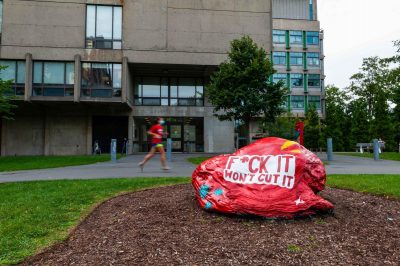
After Boston University first announced the closure of campus due to the COVID-19 pandemic more than a year ago, students are expressing their anger and frustration over the time that has been lost to the coronavirus.
F— It Won’t Cut It, a student-run advertising campaign that promotes COVID-19-safe behaviors on campus, encouraged students to participate in the #MOMENTOFSCREAMING to release their frustrations at 1:06 p.m. Thursday — exactly a year to the minute when the University announced its closure last Spring.
While the Charles River Campus was bustling with students, and many gathered in small groups on the grass at BU Beach, no students could be heard screaming.
Recent College of Communication graduate Hannah Schweitzer, a strategist and project manager for FIWCI, said the team anticipated the lack of in-person screaming.
“When we were planning this event,” she said, “we knew a lot of people probably wouldn’t participate in the live scream.”
Schweitzer said the goal of the campaign was to encourage students and assure them that their feelings of anger and loss are valid.
“People have been feeling kind of down that day, feeling upset and frustrated with just everything that this pandemic has put on our shoulders,” she said, “then at least they know that those feelings are completely normal and so many people are feeling the exact same way.”
Schweitzer emphasized that FIWCI received a large response online, with many students “screaming virtually” through social media comments on the group’s Instagram page.
Niharika Verma, who graduated from COM with her master’s last year and is a content strategist for FIWCI, said the pandemic has affected the mental health of many students.
“Through our research, we realized that a lot of people were quite frustrated with how things have been going,” Verma said. “They were feeling anxious, and they were feeling stressed.”
While their student-run campaign can’t change how the University handles the pandemic, Verma said they can provide suggestions for students to better take care of their health during the pandemic.
“It’s been a year, and we’re allowed to scream if that’s what we feel like doing,” Verma said.
Questrom School of Business junior Reece Bordick said he felt he had missed out on important parts of his college experience — one of his internships was canceled, and he had to take Questrom’s Cross Functional Core curriculum, where students spend the semester in teams creating and marketing business products, completely virtual.
“Obviously they did a pretty good job, I wasn’t too mad about it,” Bordick said. “But it’s definitely something I wanted to do in person, I was looking forward to since my freshman year.”
He added the screaming event may have come too late for many students who have already been forced to face the consequences of COVID-19.
“Maybe it’s a little late for the screaming,” Bordick said. “It seems like everyone’s already accepted the pandemic and what’s going on, so I think they’re a little too late with that, honestly.”
Natalie Gonzalez, a junior in the College of Arts and Sciences, was similarly impacted by the pandemic — she couldn’t study abroad nor direct a Shakespeare play. Gonzalez, a former president of the BU Shakespeare Society, said most of her social interactions through theater were not translated easily over Zoom.
“I also hate Zoom and I hate online classes and things in general, I find it so difficult to pay attention,” Gonzalez said. “The last year has actually sucked. It’s been astronomically awful.”
Gonzalez said she believed the #MOMENTOFSCREAMING, while an interesting idea, is not a practical way to help many students struggling.
“I think there’s things that need to be changed, definitely,” she said, “that a scream wouldn’t quite help.”
However, Gonzalez said the idea of the scream was appealing to her as a way of promoting shared commiseration.
“I do appreciate the idea that a collective scream amplifies the voices of the anguished and makes everyone feel like we are a collective, suffering whole,” Gonzalez said, “and today we’re just going to scream about it like babies and it’s going to be great.”
Abby Sklar, a junior in CAS, said the pandemic has altered many pivotal moments in a young person’s life, such as senior year of high school and college application season.
“When you’re applying to college, you feel like ‘Oh, you know, if college isn’t the best four years of your life, you’re doing it wrong,’” she said. “Compared to what a lot of people are going through, that’s nothing, but it’s not nothing.”
While she understands that missing out on the classic four-year college experience is insignificant in the grand scheme of things, Sklar said she also has regrets about how she spent her first two years.
“We didn’t do things the last two years because it felt like we had more time, and so now it’s like, ‘Oh, why didn’t we go to more hockey games or go to more frat parties,’” Sklar said, “or all of the things that didn’t feel like that big of a deal to miss out on.”
She added that she knew about FIWCI’s event Thursday, but could not participate in any screaming because she was in class at the time.
“It’s really cool to have an event like that, I guess,” Sklar said, “but doing it when not everybody can participate is also frustrating.”
CAS freshman Malik Baker said he was also in class at the time of the event and was not able to participate, but supported it nonetheless.
“I’m okay with screaming,” Baker said. “Screaming always helps.”





























































































































